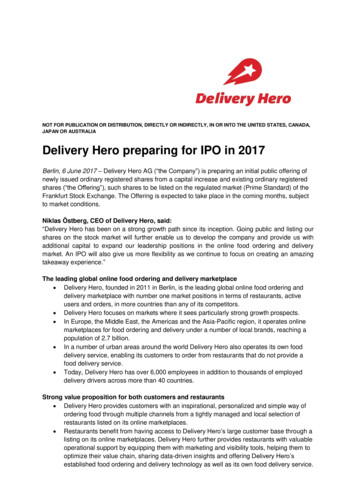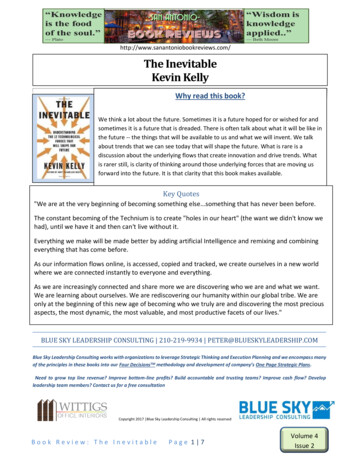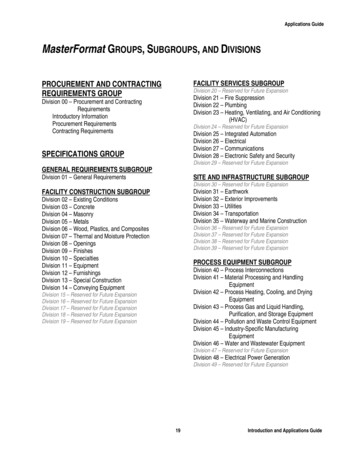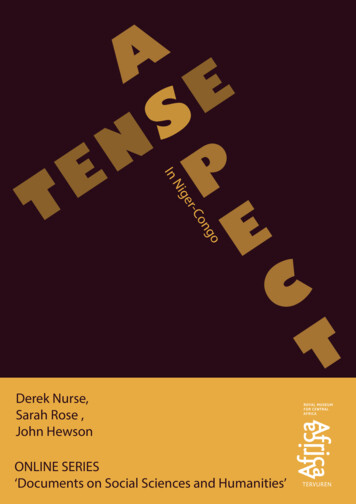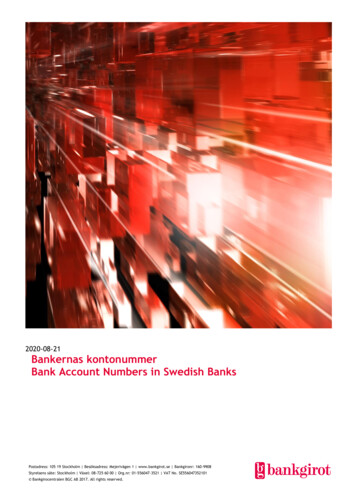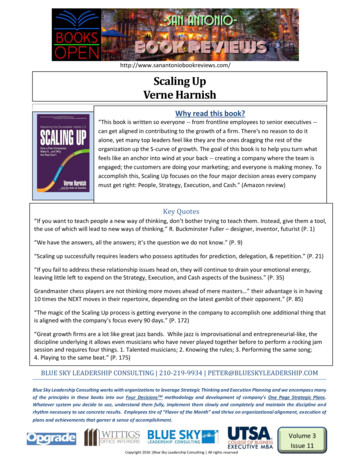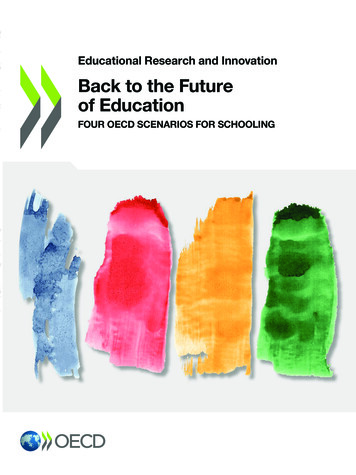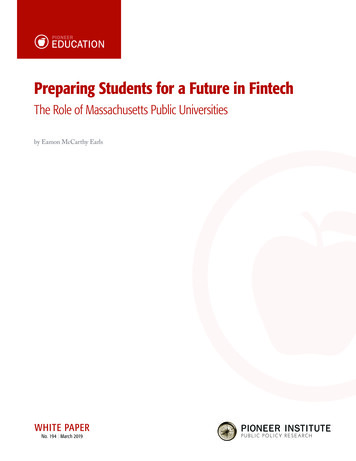
Transcription
Preparing Students for a Future in FintechThe Role of Massachusetts Public Universitiesby Eamon McCarthy EarlsWHITE PAPERNo. 194 March 2019
PIONEER INSTITUTEPioneer’s MissionPioneer Institute is an independent, non-partisan, privately funded research organization that seeks to improve the qualityof life in Massachusetts through civic discourse and intellectually rigorous, data-driven public policy solutions based on freemarket principles, individual liberty and responsibility, and the ideal of effective, limited and accountable government.This paper is a publication of Pioneer Education, which seeks to increase the educationoptions available to parents and students, drivesystem-wide reform, and ensure accountabilityin public education. The Center’s work buildson Pioneer’s legacy as a recognized leader in thecharter public school movement, and as a champion of greater academic rigor in Massachusetts’elementary and secondary schools. Current initiatives promote choice and competition, schoolbased management, and enhanced academicperformance in public schools.Pioneer Health seeks to refocus the Massachusetts conversation about health care costs awayfrom government-imposed interventions, towardmarket-based reforms. Current initiatives includedriving public discourse on Medicaid; presenting a strong consumer perspective as the stateconsiders a dramatic overhaul of the health carepayment process; and supporting thoughtful tortreforms.Pioneer Public seeks limited, accountable government by promoting competitive delivery ofpublic services, elimination of unnecessary regulation, and a focus on core government functions.Current initiatives promote reform of how thestate builds, manages, repairs and finances itstransportation assets as well as public employeebenefit reform.Pioneer Opportunity seeks to keep Massachusetts competitive by promoting a healthy businessclimate, transparent regulation, small businesscreation in urban areas and sound environmental and development policy. Current initiativespromote market reforms to increase the supplyof affordable housing, reduce the cost of doingbusiness, and revitalize urban areas.Pioneer Institute is a tax-exempt 501(c)3 organization funded through the donations of individuals, foundations and businessescommitted to the principles Pioneer espouses. To ensure its independence, Pioneer does not accept government grants.i
PREPARING STUDENTS FOR A FUTURE IN FINTECH : THE ROLE OF MASSACHUSE T TS PUBLIC UNIVER SITIESTable of ContentsExecutive Summary 4What is fintech? The scope andimpact of new technology in finance 4The changing face of the Massachusetts finance industry 4Examining the pipeline 4Fintech initiatives at other universities 5Getting business and finance students on track for fintech 5Nurturing fintech skills in computer science students 6Conclusion 7Recommendations 7
PREPARING STUDENTS FOR A FUTURE IN FINTECH : THE ROLE OF MASSACHUSE T TS PUBLIC UNIVER SITIESExecutive SummaryThe changing face ofthe Massachusetts finance industryFinancial technology (fintech) is a term applied to diverse digital technology changes impacting banking, insurance, andother sectors of the finance industry. As a new and emergingfield, technologically diverse fintech companies are gainingmarket share and changing the way business is conducted intraditional financial institutions, in an example of what Harvard Business School researcher Clayton Christensen hasdubbed “disruptive innovation.”1 The Commonwealth of Massachusetts, including its major metro areas, Boston, Worcester, and Springfield, is already feeling the effects of the majorchanges brought by fintech. In November, 2018, the BostonBusiness Journal reported that only two industries in Bostonhave seen declines in headcount since the 2008 recession —finance and insurance.2 According to a January 2018 Financial Times article, the area where finance overlaps technologyis still rarely taught, even at top-tier graduate-level businessschools.3 If many leading business schools aren’t yet gettingit right, where should Massachusetts public universities findinspiration?“Fintech is a new form of finance which has to be understood before it can be applied. If you don’t understand thesetrends and new forms of finance, you’re at a disadvantage,” saidProfessor Mark Williams, executive-in-residence for financeat Boston University.4There are some exemplars within higher education andbeyond, with a few first movers beginning to address the needfor fintech training and career development. These models canhelp public universities find innovative ways to adapt educational programs to better prepare business and computer science students for careers in fintech — or in existing financialenterprises redefined by new technology.Massachusetts plays an outsized role in the U.S. and international financial services market. The Executive Office of Laborand Workforce Development reported 220,637 people in theCommonwealth employed in finance across 17,574 establishments in June 2018.9 More in-depth analysis from PricewaterhouseCoopers, published by the New England Council in2017, found 174,072 people employed directly within financialservices companies in 2015, amounting to a total employmentcontribution of 478,960 people. The three branches of financemost active in Massachusetts are insurance — the largest category of employment with 72,293 workers — banking, andasset management, the smallest category with only slightlymore than 31,000 employees but with the highest averagewages of over 300,000 annually, including administrators.10Additionally, New England as a whole is a hub for fintechcompanies, which attracted up to 750 million in investmentthrough early 2016, principally in the Greater Boston area.11Fintech’s impact, first felt in front-office data entry andaccounts payable roles is beginning to ascend the skill ladder. Automated investment advice systems, also known asrobo-advisors, are poised to threaten traditional investmentadvisors.12 Boston-based consulting firm, Opimas, estimatesthat AI adoption could result in the loss of up to 90,000 assetmanagement jobs globally by 2025, as human portfolio managers are challenged by the increasingly large data sets usedto inform investments. Securities services, wealth management and sales and trading will also be affected by machinelearning, perhaps resulting in smaller sales teams supported bycomplex cognitive analytics and advanced customer relationship management systems.13Continued fintech innovation will likely impact the Massachusetts financial industry moving forward and could leadto reduced headcount at many firms. However, fintech alsopromises new opportunities within technology-side fintechvendors and traditional financial services organizations.What is fintech? The scope andimpact of new technology in financeFintech describes new technology aimed at improving andautomating the delivery of financial services.5 The termencompasses a wide variety of finance industry segments, suchas crowdfunding, peer-to-peer lending, payments, data collection, cryptocurrency, credit scoring, cybersecurity for finance,thematic investing, algorithmic asset management, stock andbond investing, private securities transactions and more. Newtechnologies compete with traditional finance models andchange the internal processes of financial companies.6 Financial companies that fail to adopt fintech innovations will seeprofit declines of 20 to 60 percent by 2025, according to McKinsey & Company.7 But simply adopting new technology isnot enough. According to Nadeem Shaikh, writing in Harvard Business Review, innovation — in essence, human capitaland the application of new modes of thinking — will provefar more important to the future of finance rather than simply“bolting on” new technology.8Examining the pipelineMassachusetts has some of the most competitive school districts in the United States. That’s the good news. But thespecific educational attainments that could lead to fintechcareer choices and support higher-ed fintech coursework isnot always in evidence. The Commonwealth does not offer orrequire financial literacy courses in high school, although various House bills have attempted to provide for their implementation.14 Frameworks already in place like STEM (Science,Technology, Engineering and Math) or the creative thinking in STEAM (Science, Technology, Engineering, Art andMath), as imagined by the Rhode Island School of Design,both offer examples of how preparation for fintech could be4
PREPARING STUDENTS FOR A FUTURE IN FINTECH : THE ROLE OF MASSACHUSE T TS PUBLIC UNIVER SITIESincorporated into elementary, middle and high schools.15 Fornow, these frameworks offer the closest analogs for a fintechpathway from high school to college and help contribute someof the technical skills and design thinking increasingly neededin the financial services industry.Management University’s Certificate in FinTech and Innovation emphasizes “design thinking” and financial regulation.20To build additional relevant skills, many universities havebegun to offer electives encompassing fintech topics. Examples include UC Berkeley’s blockchain course. Offered oncampus for students interested in understanding and developing blockchains, the course was retargeted in an online versionfor professionals interested in retraining or students at otheruniversities not offering blockchain electives, for a Professional Certificate in Blockchain Fundamentals.21Fintech initiatives at other universitiesUniversities around the world are beginning to examine fintech preparedness and some are attempting to create coursework to fill the skills gap. Characteristically, the majorityof university fintech programs in existence have focused onregulation, security considerations and understanding theimpact of technology on the market. This high-level approachdoes not go into depth about individual technologies, leaving students to learn on the job or pursue additional electivecoursework. To avoid teaching students the “wrong” versionof fintech, which could leave them with out-of-date skills fora dynamic and rapidly changing field, public universities inMassachusetts must seek continual input from industry, wherethe change is occurring.MBA programs in particular have hastened to offer fintechcoursework. For example, Brandeis University in Walthamoffers dedicated fintech degree paths for MS in Finance candidates. Over two years, students complete courses such asPython and Applications to Finance, Quantitative InvestmentManagement, Predictive Analytics and FinTech in CorporateInnovation, Venture Capital and Entrepreneurial Finance,Computer Simulation and Risk, Corporate Financial Engineering and Technological Rivalry.16 MIT’s Sloan Schoolof Management has adopted an interdisciplinary approachsince the launch of its fintech ventures course in fall 2015.The course focuses on creating business models for fintechventures, drawing on a combination of Sloan students, participants from MIT engineering and computer science and evenattendees from Harvard Law School.17Other prominent American business schools now offeringfintech coursework include the University of Pennsylvania,Columbia, Stanford and Georgetown. In a series of 2017Reuters interviews, academics who were charged with leadingfintech programs said constructing syllabuses was challengingdue to a lack of textbooks and professors with fintech knowledge. To overcome these challenges, many universities havebegun to invite fintech executives who have more up-to-dateknowledge to speak.18Internationally, the University of Oxford Fintech Programme encompasses topics such as the future of money andmarkets, infrastructure and regtech, proptech, real estateinnovation and financial innovation.19 The Open Universityin the UK has taken a different approach giving students abroad overview of fintech and its origins, how these technologies are changing the business landscape, as well as regulatoryand cybersecurity considerations.20 Similarly, the SingaporeGetting business and finance studentson track for fintechPublic universities in Massachusetts can strive to offer coursework that gives a broad overview of fintech and regulation byexamining in-demand skills as well as the pioneering effortsof early movers in academic fintech. For students, a key goal offintech education is to develop the tools to think ahead of thecurve. The Commonwealth’s public universities cåan developtheir own courses about how technological change plays outin markets.In addition, Massachusetts public universities can begin aprocess of examining their elective coursework across disciplines, identifying areas of opportunity for business studentsto gain further fintech-related skills. University administratorscould consider expanding some elective course opportunities,setting up new tracks for business majors or developing certificate programs for business students to package their additional course experiences for potential employers. New pathsmight incorporate introductory courses for computer scienceor data science topics such as scraping, cleaning, managingand processing data. Additionally, a training ecosystem withmajor technology vendors could expose business students todistributed systems management (the process of putting computer workloads into major cloud systems like Amazon AWS,Microsoft Azure or Google Cloud), advanced customer relationship management (CRM), enterprise resource planning(ERP), business intelligence and no-code application development software systems like Salesforce Essentials or MicrosoftDynamics. With the example of leading graduate businessprograms at MIT and Brandeis in mind, Massachusetts publicuniversities might also consider building in more forecastingand analytics training at the undergraduate and graduate level.“You need to have people with [an awareness of] softwaredevelopment, Python, C and the ability to have strongmath skills. Fintech’s much more quantitatively inclined,” saidProfessor Williams, who spearheaded the creation of BostonUniversity’s new IS 815 Fintech Revolution course.22For students on a finance or fintech path, the Pythonprogramming language is currently in widespread use foradvanced analysis. In fact, it is a prerequisite for Brandeis’5
PREPARING STUDENTS FOR A FUTURE IN FINTECH : THE ROLE OF MASSACHUSE T TS PUBLIC UNIVER SITIESgraduate course in Machine Learning and Data Analysis forBusiness and Finance.23 The popularity of software languagescan change over time, but advanced mathematical knowledgerelated to statistics, algorithms, linear algebra and ordinarydifferential equations may be even more relevant for machinelearning longer term.24“We find that it’s not enough to teach the theoretical; weneed to incorporate technological expertise. Technical analysis is one example. We are now requiring students to getproficient in statistical packages like R if they’re going to doany sort of modeling. The biggest change we’re in the processof making because of fintech is for [new abilities]. We findthat as our students are hitting the job market, the questionsthat employers are asking them [are different]. They end up infinance companies doing technology heavy jobs,” said DeanArindam Bandopadhyaya, head of the UMASS Boston College of Management.In fact, UMASS Boston is even changing the skills itteaches to PhD students. “The biggest curriculum reformwe’re thinking of is at the PhD, because the traditional PhDfinance curriculum is coming under attack. It used to be basedon basic micro-, macro- and corporate finance. Now we thinkthe basic core curriculum needs to be technically oriented withfinance built on top of that,” he added.25Dean Chris Pilsner of UMASS Amherst’s IsenbergSchool of Management indicated similar growing interest inAI and machine learning. “Isenberg students will benefit fromour faculty’s thought leadership with a new concentrationin fintech for undergraduate students, which has a tentativelaunch targeted for fall 2019. A graduate-level program infinancial data analysis is also under consideration. The curriculum of these programs would explore machine learning,AI, advanced data analytics, as well as peer to peer lending.”In addition, Professor Hossein Kazemi has spearheaded Isenberg’s fintech focus, curating the 2017 CISDM conference formachine learning in finance and co-launching the Journal ofFinancial Data Science.26However, the response to fintech has been mixed. According to Dean Susan Dargan, Framingham State University’sbusiness program has remained primarily focused on moretraditional financial topics, with the exception of MicrosoftExcel online, which is required for courses like FINA 248.27Because fintech companies or fintech operations in majorfinancial enterprises are often structured around lengthy software projects, project management skills are in high demandamong Massachusetts employers. In fact, the Project Management Institute projects a 33 percent increase in project-oriented roles by 2027, bringing the nationwide total of such jobpaths to 8.8 million.29 Currently, UMASS Boston, UMASSLowell and UMASS Online offer project managementcoursework.29 However, these courses are only offered to continuing education students and might be good candidates toextend to the general student population, and business majorsin particular. For students on an accounting path, particularlythose pursuing MS Accounting degrees, Massachusetts publicuniversities could consider establishing a certificate programlike one offered at NYU’s Stern School of Business or addinga course about advanced valuation methods needed to helpassess intellectual property and intangible asset technologybusinesses such as those in fintech.30“Particularly the way we teach asset valuation has shifted.Earlier on our focus in undergraduate and graduate curriculum was more on the fundamental analysis of balance sheetsand deciding under- or over-valuation. We have introducedmore technical indicators in our theoretical discussions andpractical analysis in labs. Students are using technology toanalyze market data and sense momentum, floors and ceilingsfor price,” said Dean Bandopadhyaya.31Nurturing fintech skillsin computer science studentsWhile business students may feel the impacts of fintechgrowth most directly in their chosen field, computer sciencestudents at Massachusetts public universities may find themselves working for companies providing fintech software orwithin existing financial services companies doing softwaredesign, development and configuration.However, as fintech becomes a growing focus for somecomputer science students, the skill sets required may begin toresemble the “soft skills” already widely taught in business programs. Whether working in tightly integrated teams at smallcompanies or large enterprises, computer science graduateswill need to transcend the technical aspects of their fields forsuccessful collaboration — or to pitch their fintech innovationideas to investors and buyers. Only a handful of North American universities require computer science students to takecommunications classes. Fewer still focus on interpersonal aswell as written and oral communication. UMASS Amherst,for instance, requires Junior Year Writing for computer science majors, but could borrow concepts from the Universityof Toronto’s Communication Skills for Computer Scientistscourse.32Computer science departments at Massachusetts publicuniversities can work toward greater integration with businessdepartments. Like business schools, these programs could create specific tracks for fintech and count some business coursework toward the computer science degree, such as introductory courses in finance and accounting. Examples of courseworkthat could be offered for a fintech track might include a lookat financial regulation around the world, examining thewide-reaching effects of the European Union’s General DataProtection Regulation or California’s Consumer Privacy Actof 2018.33Upwards of 60 percent of information technology professionals indicate that the majority of their apps run on cloud6
PREPARING STUDENTS FOR A FUTURE IN FINTECH : THE ROLE OF MASSACHUSE T TS PUBLIC UNIVER SITIESinfrastructure. UMASS Amherst has already made effortsto prepare public university students with cloud skills — forfintech and other business uses — with its elective CS590CC:Cloud Computing, which covers Microsoft Azure, OpenStack, Google AppEngine and Amazon EC2.34 A fintechtrack could incorporate coursework from the UMASSAmherst Security and Privacy Track, which includes topicssuch as cryptography and digital forensics. Along with training graduates for cybersecurity careers, which often overlapwith the security demands of fintech, the Security and PrivacyTrack serves as a model for future coursework expansion forsmaller state university computer science departments.that give graduates a competitive edge in the new age of fintech. Some Massachusetts public universities have alreadymade progress toward preparing their business and computer science students for careers in fintech companies, as wellas in traditional financial enterprises redefined by changingtechnology. However, others are just getting started. Overall,additional preparation is needed throughout the state’s publicuniversity system.Academic leaders can begin — or expand — a process ofassessing current coursework and degree paths, potentiallycreating new prerequisites or entirely new avenues to degreecompletion for business and computer science students. Byworking to understand shifts in the market brought on byfintech and their implications for job skills demand, publicuniversities can endeavor to better prepare undergraduate andgraduate students for the future and strengthen one of the coreindustries of Massachusetts.ConclusionBecause of the centrality of the financial services and technology industries in Massachusetts, our public universities are ina unique position to play a lead role in developing programsRecommendations1. To ensure the efficient and effective transmissionof information from industry, public universitiescould create a statewide advisory board to adviseon the evolution of fintech that includes industryprofessionals, experts and public university andcommunity college personnel to examine relevantcourse offerings, professional certifications, trackswithin relevant degree programs and aligningthose offerings. Massachusetts public colleges anduniversities should: Expand coursework and related electives toinclude fintech topics, including in machinelearning, data analysis, and fintech in traditionalbusiness/finance disciplines. Establish professional certification programs forindividuals wishing to continue their educationand adapt to the changing role of fintech infinance and business.Create new tracks within established business andcomputer finance degree programs to integratefintech topics and skills into students’ educationalexperience. Plan opportunities for interdisciplinary experiencesfor business, computer science, engineering, andother degree candidates to develop a robust set ofskills needed for fintech-related jobs.2. Any higher education institution, public or private,should seek input from industry representatives onskills needed for the workforce and how fintech ischanging the finance industry. Finally, though outside the bounds of this currentpaper, Massachusetts vocational high schools would dowell to explore the development of course offering andprograms on fintech in order to ensure that Massachusetts students are well-prepared for the future.7
PREPARING STUDENTS FOR A FUTURE IN FINTECH : THE ROLE OF MASSACHUSE T TS PUBLIC UNIVER SITIESEndnotes1. “Disruptive Innovation,” Clayton Christensen, last modifiedJanuary, 2019, http://claytonchristensen.com/key-concepts/.19. “Oxford Fintech Programme,” University of Oxford, January 1,2019, programme.2. Greg Ryan, “Bare market: Mass. financial services employmentis on the decline since the recession,” Boston Business Journal,November 29, 2018, html.20. “Understanding Financial Technologies,” The Open University,2017, pen.ac.uk.business-school/files/files/BG024 df.3. Helen Barrett, “Business schools have a problem with fintech,”Financial Times, January 22, 2018, -bbdefa4f210b.21. “SMU Certificate in FinTech & Innovation,” SingaporeManagement University, January 10, 2019, -innovation-1111.4. Mark T. Williams, interview by Eamon McCarthy Earls, March12, 2019.22. “Professional Certificate in Blockchain Fundamentals,” UCBerkeley, 2017, keleyx-blockchain-fundamentals.5. “Fintech,” Investopedia, December 18, asp.23. “Syllabus-Bus241f: Machine Learning and Data Analysis forBusiness and Finance,” Brandeis University, 2017, http://people.brandeis.edu/ blebaron/classes/bus241f/Syllabus.html.6. Christophe Williams, “What is FinTech?” Wharton FinTech, lastmodified February 2, 2016, 16/what-is-fintech.7.24. Wale Akinfaderin, “The Mathematics of Machine Learning,”March 23, 2017, The Fight for the Customer: McKinsey Global Banking—AnnualReview 2015,” McKinsey, 2015, p. 26.25. Dean Arindam Bandopadhyaya, interview by Eamon McCarthyEarls, February 20, 2019.8. Nadeem Shaikh, “The Financial Industry Needs to Start Planningfor the Next 50 Years, Not the Next Five,” Harvard BusinessReview, July 17, 2017, ext-five26. Dean Chris Pilsner, interview by Eamon McCarthy, March 6,2019.27. Dean Sue Dargan, interview by Eamon McCarthy Earls, March 5,2019.9. “Financial Services: Employment and Wages Report,” ExecutiveOffice of Labor and Workforce Development.28. “Project Management: Job Growth and Talent Gap, 2017–2027,”Project Management Institute, 2017, . “The New England Financial Services Industry: Around the Cornerand Around the World,” New England Council, January, ncial-ServicesReport-Jan-2017-FINAL.pdf.29. “Practical Project Management,” UMASS Boston, 2018, ctmgmt.;“Certificate in Project Management,” UMASS Lowell, nt/certificate.cfm.11. Ibid., 26.12. Ibid., 28.13. Paul Clarke, “How artificial intelligence will eat your financejob — and how to survive,” efinancialcareers, March 20, ce-jobs/.30. “Advanced Valuation,” New York University, e-certificate-courses/onlinevaluation-course.31. Dean Arindam Bandopadhyaya, interview by Eamon McCarthyEarls, February 20, 2019.14. “Massachusetts,” AFSA Education Foundation, 2019, active-Map/Massachusetts.32. “Revised BS Requirements,” UMASS Amherst, September, -requirementseffective-september-2016.; Lil Blume, et. al. “A ‘CommunicationSkills for Computer Scientists’ Course,” University of Toronto,2009, -data/pdf/blu2009a.pdf.15. “What is STEAM?” RISD, 2019, http://stemtosteam.org/.;Science, Technology/Engineering, and Mathematics (STEM),Department of Education, July 2, 2018, http://www.doe.mass.edu/stem/.16. “FinTech,” Brandeis University, last modified 2017, iculum/fintech.html.33. Sarah Hospelhorn, “California Consumer Privacy Act vs. GDPR,”Varonis, November 5, 2018, https://www.varonis.com/blog/ccpavs-gdpr/.17. Nathan Allen, “Why Fintech Is So Hot Among MBAs,”Poets & Quants, September 1, 2016, among-mbas.34. “CS590CC: Cloud Computing,” UMASS Amherst, August, 2017,https://people.cs.umass.edu/ arun/590CC/.18. “Business Schools Are Embracing Fintech to Fill Gaps on WallStreet,” Reuters, June 8, 2017, tech-wall-street/.35. “Oxford Fintech Programme,” University of Oxford, January 1,2019, programme.8
PREPARING STUDENTS FOR A FUTURE IN FINTECH : THE ROLE OF MASSACHUSE T TS PUBLIC UNIVER SITIES36. “Understanding Financial Technologies,” The Open University,2017, pen.ac.uk.business-school/files/files/BG024 df.37. “SMU Certificate in FinTech & Innovation,” SingaporeManagement University, January 10, 2019, -innovation-1111.38. “Professional Certificate in Blockchain Fundamentals,” UCBerkeley, 2017, keleyx-blockchain-fundamentals.39. “Syllabus-Bus241f: Machine Learning and Data Analysis forBusiness and Finance,” Brandeis University, 2017, http://people.brandeis.edu/ blebaron/classes/bus241f/Syllabus.html.40. Wale Akinfaderin, “The Mathematics of Machine Learning,”March 23, 2017, https://towardsdatascience.com/@WalePhenomenon.41. Dean Arindam Bandopadhyaya, interview by Eamon McCarthyEarls,
math skills. Fintech’s much more quantitatively inclined,” said Professor Williams, who spearheaded the creation of Boston University’s new IS 815 Fintech Revolution course. 22 For students on a finance or fintech path, the Python programming langu



